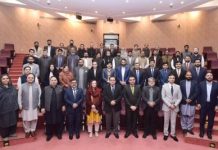By Asim Hussain
ISLAMABAD: The Lawmakers in the National Assembly on Friday demanded allocation of more funds for construction of new water reservoirs in the financial year 2023-24 to meet water and energy requirements of the country.
Participating in the National Assembly debate on the federal budget, they highlighted key points of the fiscal plan tabled before the House for achieving economic stability and the growth targets.
Muhammad Afzal Khokhar of the Pakistan Muslim League-Nawaz (PML-N) praised Prime Minister Shahbez Sharif and Finance Minister Ishaq Dar for presenting a balanced budget that prioritized the needs of the common man and farmers.
He also acknowledged the government’s efforts in improving the road infrastructure across the country and supporting the much needed reforms in the agriculture sector, considered backbone of the national economy.
Khokhar commended the government’s decision to increase salaries and pensions of government employees and provide laptops to students, enabling them to acquire modern skills needed to get education matching the international market requirement.
He pointed out that former Prime Minister Muhammad Nawaz Sharif initiated significant projects in the field of health, infrastructure development and laying a wide network of motorways and building new water reservoirs. Nasir Khan Musazai of Pakistan Tehreek-i-Insaf (PTI) demanded allocation of additional funds for the construction of dams, emphasizing the importance of addressing the problems faced by underprivileged citizens.
PPPP’s Mir Amer Ali Khan Magsi endorsed the sentiments of MNA Musazai, declaring the government’s allocation for construction of new water reservoirs in the federal budget ‘insufficient.’ Appreciating the government’s focus on agriculture sector, Magsi suggested taking along all stakeholders from the agriculture sector while finalizing policies as it would help get better production of various crops.
Minister for Defence Production Sardar Muhammad Israr Tareen strongly condemned the May 9 incident and asserted that it was not an act perpetrated by an external enemy. He also supported the resolution passed by the National Assembly, calling for the trial of individuals involved in the incident under the Army Act without any single-day delay.
Qaiser Ahmed Sheikh of PML-N drew attention of the House towards Pakistan’s defense budget saying that its arch rival India’s defence budget was almost 14-time higher. He urged the government to promote small and medium enterprises (SMEs) as this sector had the great potential to move the economic wheel at the faster pace and strengthen the national economy.
In response to discussions about Pakistan’s financial situation, Sheikh refuted claims of an impending default and highlighted that Pakistan’s total assets amounted to approximately $4000. However, he acknowledged the current cash flow issues faced by the country, and asked foreign investors to consider investing in diverse sectors of Pakistan and there existed tremendous potential of business because of the friendly policies announced by the government.
Syed Abrar Ali Shah of Pakistan Peoples Parliamentarian (PPPP) acknowledged that the present government presented the budget despite difficult economic situation, keeping in view the hardships of the common man and setting achievable development targets for the next fiscal year.
He appreciated the measure proposed in the budget for increasing the salaries and pensions of the government employees to mitigate their financial miseries in the scenario of increased inflation. He asked for allocation more development funds for the Sindh province and paying pending amount to execute the ongoing schemes at a faster pace.
He condemned the incidents of May 9 and criticized the leadership and workers of the Pakistan Tehreek-i-Insaf (PTI) for vandalism of military installations and memorials of martyrs just because of their ouster from the power through a constitutional way. Pakistan Muslim League-Nawaz (PML-N) Lawmaker Mehnaz Akbar Aziz termed the federal budget the ‘best one’ and appreciated the incumbent government for adopting an effective strategy to pull the country out of financial crisis and avoided the looming threat of default.
She said results of the prudent policies adopted by the government had started yielding the required results as inexpensive oil and gas started arriving Pakistan from Russia and Azerbaijan respectively. The PML-N expressed confidence that the government’s effective fiscal plan, which covered all sectors, would usher a new era of progress and development in the country as the macroeconomic indicators started moving towards stability.
PPPP’s Nasiba Channa said her party always worked for the welfare of the common man and increased salaries and pensions of the government employees remarkably during its last tenure, besides initiating development projects for strengthening the national economy. She said PPPP leadership was committed to making the common man prosperous and ending their sense of deprivation.
Dr. Zulfiqar Ali Bhatti, a Lawmaker from PML-N, lauded the current budget as the best one considering the prevailing economic situation. He emphasized that the rural economy deserved special attention as it remained a significant challenge for the country. Recognizing agriculture as the backbone of the economy, he urged for focused efforts in this sector.
Bhatti also suggested that Benazir Income Support Program (BISP) should introduce new programs aimed at skill development, extending such opportunities to empower the impoverished. In addition, he raised concerns about the state of health, education, and road infrastructure in his constituency (NA-91, Sargodha-IV).
Highlighting the popularity of wooden handicrafts in his area, Dr. Bhatti expressed disappointment over the lack of a proper mechanism for their export. He strongly condemned the incident that occurred on May 9 and offered prayers for a brighter future for Pakistan. MNA Naz Baloch expressed her dissatisfaction with the absence of ministers during the budget session.
She asserted that the national economy was faring much better in 2018, but after that, the party in power mishandled the economy and various departments. Condemning the May 9 incident, Naz Baloch emphasized that our red line was Pakistan rather than any individual and damage to the memorials of martyrs or civil and military installations was intolerable.
She further criticized the PTI, labeling it as a symbol of lies, propaganda, misbehavior, polarization, and hatred. She stressed that Pakistan could not afford such attitudes due to its geographical situation, emphasizing the need for stability and a serious approach.
Referencing the behavior of the former Prime Minister from PTI, she drew parallels to the actions of past monarchs who used to victimize their opponents and imprison them. Naz Baloch highlighted that our leader Benazir Bhutto taught us tolerance and inclusivity, even in the face of a no-confidence motion that she gracefully handled.
After successfully overcoming the no-confidence motion, Benazir Bhutto invited the opposition to join hands for the prosperity of Pakistan and work together towards that goal. She highlighted that after the tragic assassination of the esteemed leader Benazir Bhutto, Mr. Asif Ali Zardari passionately advocated for a united Pakistan through the slogan ‘Pakistan Khappay’ (We Wan Pakistan).
She emphasized the need for a rational approach in politics to attract foreign investment and foster economic growth. Furthermore, she commended the Foreign Minister for effectively managing foreign affairs and representing Pakistan’s interests on the international stage.
PML-N’s Zahra Wadood Fatemi termed the budget ‘balanced and good’ in the prevailing economic situation and expressed confidence that her party leadership had the ability to turn around the economy and get the pace of national development which was taking place in 2017.
Ahmed Raza Maneka of PML-N said Pakistan’s economy was growth at 6.1 percent with 4 per cent inflation and $24 billion under the leadership of Muhammad Nawaz Sharif in 2016-17, besides inching towards becoming the member of G20 states by 2030 as per calculation of a global company, the PricewaterhouseCoopers (PWC).
“Pakistan was going to become a prosperous nation at that time,” he said adding the pace of development was halted by installing a selected-government after the 2018 elections that ruined the national economy and brought the country on the brink of collapse. He condemned the May 9 incident and stressed the need for trial of all those involved in the anti-state activities under the Army Act. Later the House was adjourned to meet again on Saturday at 11 a.m.






